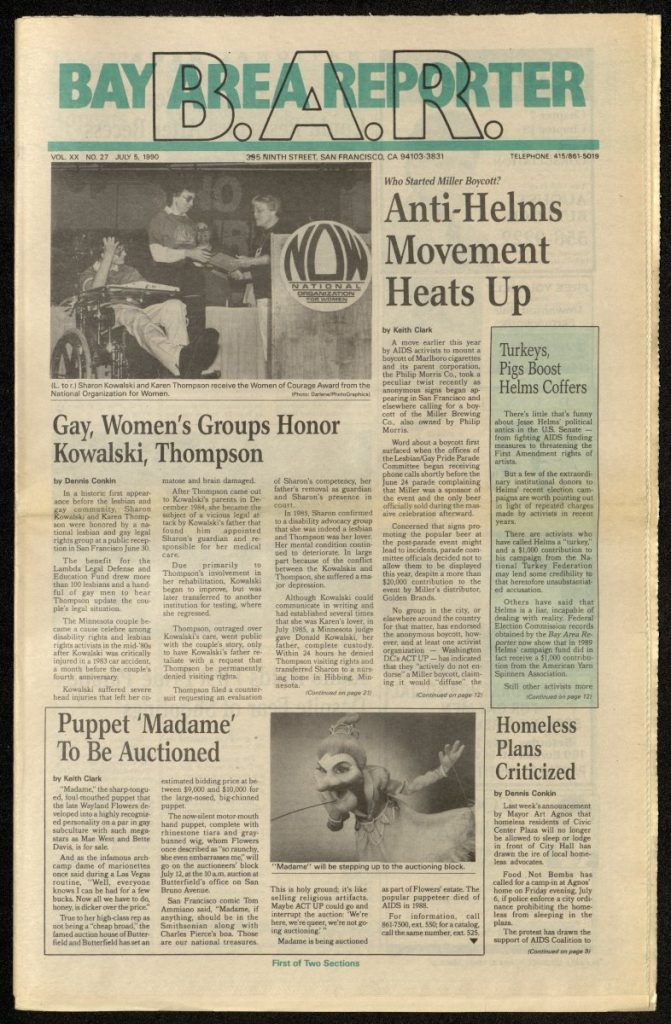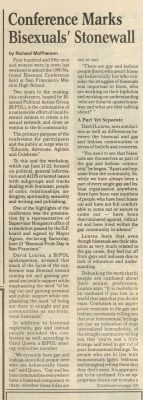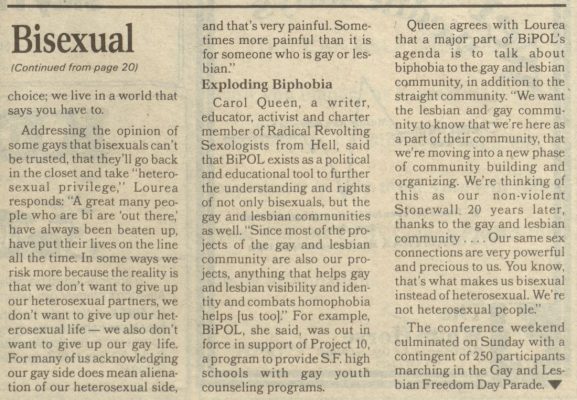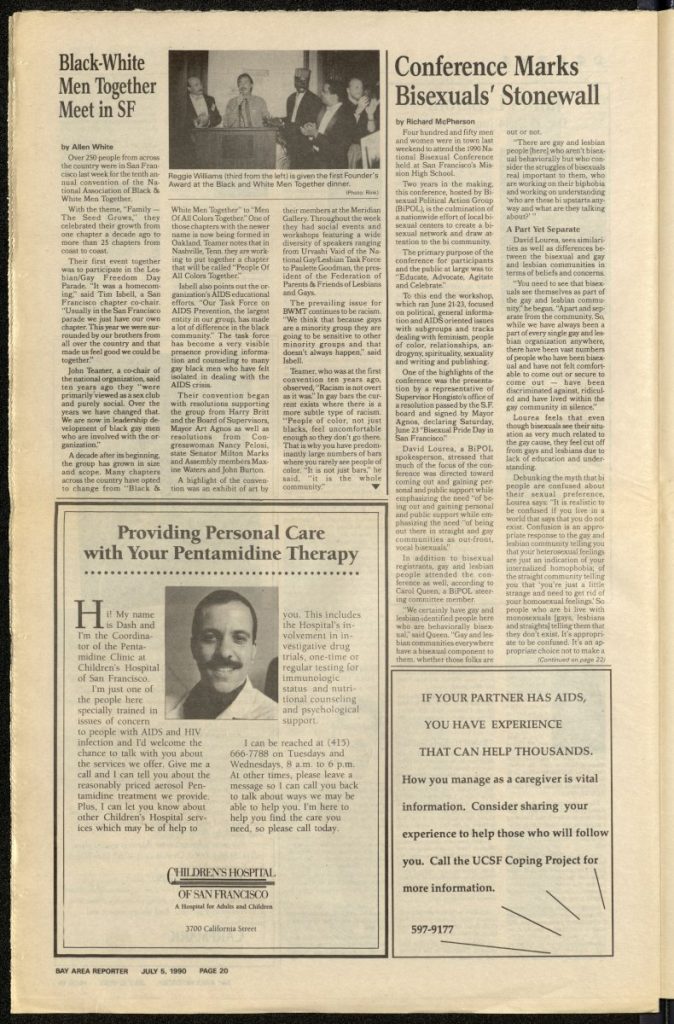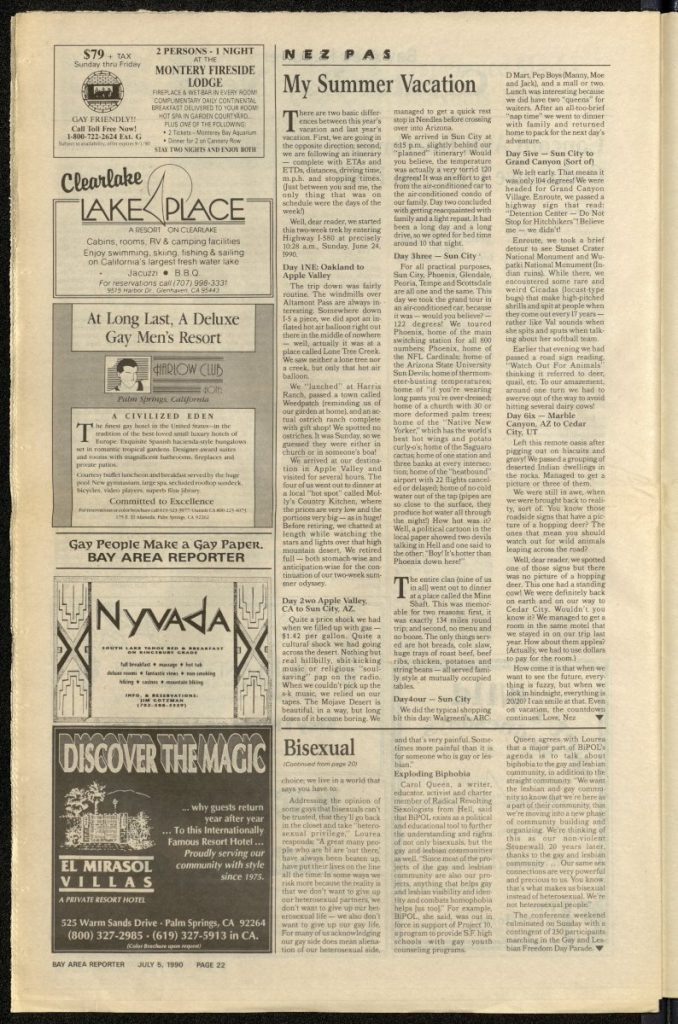The mention of the Revolting Sexologists from Hell in Bi-Issues #1 got me doing a search for them. Before today, Google knew of one usage, in a Bay Area Reporter[1]Founded in 1971, the BAR is the USA's the oldest continually published LGBT newspaper. The article on the conference was just after two pages of obituaries, almost all as a result of Aids:
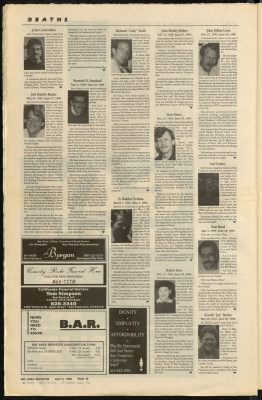
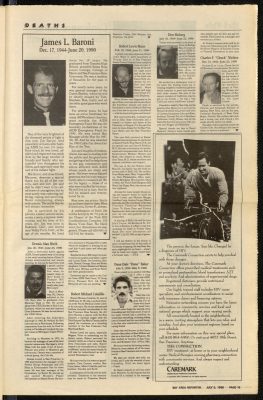 article on the first US 'national bisexual conference' in 1990. (And it should have been the 'Radical Revolting Sexologists from Hell'!)
article on the first US 'national bisexual conference' in 1990. (And it should have been the 'Radical Revolting Sexologists from Hell'!)
I didn't go to the conference – too poor, amongst other things – but several people from the UK did. I do have a couple of the brochures from it – one as a result of Robyn bringing some to the 1990 BiCon two months later, and one from being married to someone who did go.
That BiCon is probably where I got one of the event's t-shirts from…
Conference Marks Bisexuals' Stonewall
by Richard McPherson
Four hundred and fifty men and women were in town last weekend to attend the 1990 National Bisexual Conference held at San Francisco's Mission High School.
Two years in the making, this conference, hosted by Bisexual Political Action Group (BiPOL), is the culmination of a nationwide effort of local bisexual centers to create a bisexual network and draw attention to the bi community.
The primary purpose of the conference for participants and the public at large was to: "Educate, Advocate, Agitate and Celebrate."
To this end the workshop, which ran June 21-23, focused on political, general information and AIDS oriented issues with subgroups and tracks dealing with feminism, people of color, relationships, androgyny, spirituality, sexuality and writing and publishing.
One of the highlights of the conference was the presentation by a representative of Supervisor Hongisto's office of a resolution passed by the S.F. board and signed by Mayor Agnos, declaring Saturday, June 23 "Bisexual Pride Day in San Francisco."
David Lourea, a BiPOL spokesperson, stressed that much of the focus of the conference was directed toward coming out and gaining personal and public support while emphasizing the need "of being out there in straight and gay communities as out-front, vocal bisexuals."
In addition to bisexual registrants, gay and lesbian people attended the conference as well, according to Carol Queen, a BiPOL steering committee member.
"We certainly have gay and lesbian-identified people here who are behaviorally bisexual," said Queen. "Gay and lesbian communities everywhere have a bisexual component to them, whether those folks are out or not.
"There are gay and lesbian people [here] who aren't bisexual behaviorally but who consider the struggles of bisexuals real important to them, who are working on their biphobia and working on understanding 'who are these bi upstarts anyway and what are they talking about?'"
A Part Yet Separate
David Lourea, sees similarities as well as differences between the bisexual and gay and lesbian communities in terms of beliefs and concerns.
"You need to see that bisexuals see themselves as part of the gay and lesbian community," he began. "Apart and separate from the community. So, while we have always been a part of every single gay and lesbian organization anywhere, there have been vast numbers of people who have been bisexual and have not felt comfortable to come out or secure to come out — have been discriminated against, ridiculed and have lived within the gay community in silence."
Lourea feels that even though bisexuals see their situation as very much related to the gay cause, they feel cut off from gays and lesbians due to lack of education and understanding.
Debunking the myth that bi people are confused about their sexual preference, Lourea says: "It is realistic to be confused if you live in a world that says that you do not exist. Confusion is an appropriate response to the gay and lesbian community telling you that your heterosexual feelings are just an indication of your internalized homophobia; of the straight community telling you that 'you're just a little strange and need to get rid of your homosexual feelings.' So people who are bi live with monosexuals [gays, lesbians and straights] telling them that they don't exist. It's appropriate to be confused. It's an appropriate choice not to make a choice; we live in a world that says you have to.
Addressing the opinion of some gays that bisexuals can't be trusted, that they'll go back in the closet and take "heterosexual privilege," Lourea responds: "A great many people who are bi are 'out there,' have always been beaten up, have put their lives on the line all the time. In some ways we risk more because the reality is that we don't want to give up our heterosexual partners, we don't want to give up our heterosexual life — we also don't want to give up our gay life. For many of us acknowledging our gay side does mean alienation of our heterosexual side, and that's very painful. Sometimes more painful than it is for someone who is gay or lesbian."
Exploding Biphobia
Carol Queen, a writer, educator, activist and charter member of Radical Revolting Sexologists from Hell, said that BiPOL exists as a political and educational tool to further the understanding and rights of not only bisexuals, but the gay and lesbian communities as well. "Since most of the projects of the gay and lesbian community are also our projects, anything that helps gay and lesbian visibility and identity and combats homophobia helps [us too]." For example, BiPOL, she said, was out in force in support of Project 10, a program to provide S.F. high schools with gay youth counseling programs.
Queen agrees with Lourea that a major part of BiPOL's agenda is to talk about biphobia to the gay and lesbian community, in addition to the straight community. "We want the lesbian and gay community to know that we're here as a part of their community, that we're moving into a new phase of community building and organizing. We're thinking of this as our non-violent Stonewall. 20 years later, thanks to the gay and lesbian community … Our same sex connections are very powerful and precious to us. You know, that's what makes us bisexual instead of heterosexual. We're not heterosexual people."
The conference weekend culminated on Sunday with a contingent of 250 participants marching in the Gay and Lesbian Freedom Day Parade. ▼
BAY AREA REPORTER JULY 5, 1990 PAGE 20 & 22
Notes
| ↑1 | Founded in 1971, the BAR is the USA's the oldest continually published LGBT newspaper. The article on the conference was just after two pages of obituaries, almost all as a result of Aids: |
|---|
